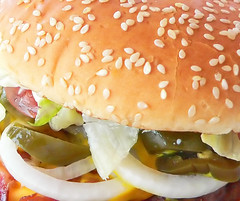But It's Wrong in Principle!
A child: Mum, I'm full. We can't really take away the remaining burger. So can I throw it away?
His mum: Hey, finish your burger, don't waste it! Do you know how many Ethiopians are starving to death? You mustn't be so wasteful!
 Everyday we make a lot of decisions. We decide whether to have a short rest in the afternoon, whether to tell the cute guy that his zipper is undone, and whether to finish our homework before playing a new Wii game. In the decision making process, we justify our actions based on a set of personal moral principles.
Everyday we make a lot of decisions. We decide whether to have a short rest in the afternoon, whether to tell the cute guy that his zipper is undone, and whether to finish our homework before playing a new Wii game. In the decision making process, we justify our actions based on a set of personal moral principles.As everyone grows up, moral axioms like "wasting food is wrong", "lying is sinful" are deeply entrenched in our minds after years of inculcation from our parents and teachers. As time goes by, we kind of forget why those principles are there in the first place - we just know that it's right, and because of that we uphold them as the noblest virtues.
To begin with, there is nothing inherently wrong with following moral principles, as they are, after all, moral. But there is a problem: we are lazy. In day-to-day scenarios, many of us do not bother to think through every decision - we often resort to the comfort of the tried-and-true principles, and apply it indiscriminately to every situation that fits the criteria. Again, it's not that there's something wrong with doing so; in fact most of the time such modus operandi just works fine. People who function as such are sometimes even positively described as highly-principled people. However, it's also because of the same reason that we hear things like:
Lying is wrong, so I must not tell lies. Not even white lies.
Telling the truth is the right thing to do - therefore I must tell the truth even if it incites anger and hatred.Such stands are obviously contentious and are no longer universally accepted. What's right for a person might be hurtful for another. Being highly-principled might not be good after all.
So, what do we say about the child in the example above?
At the first glance, this child is being wasteful and is thus by default unethical. However, why is the child at fault apart from the moral consideration? Why is he under moral obligation to finish the burger? How does the Ethiopians' extreme impoverishment translate to his obligation to finish the burger?
Here I am assuming that the child or the mum above didn't buy extra burger despite knowing that he can't finish it. I am also assuming that the burger can't be taken away. In such a hypothetical scenario, he shouldn't be blamed for not finishing the burger. Yes, we should commiserate with the starving people; but whether you finish the burger or not will not change their fate in any way, assuming that you didn't get more than what you could eat in the first place. In fact, over-eating could be detrimental to the child's health, which might contribute to the obesity problem in the country and indirectly further impoverish other countries.
Therefore, don't stick to principles stubbornly. Sometimes the end does justify the means.







7 comments:
Something pertinent which a friend penned a while ago: http://apoorwayfaringman.blogspot.com/2005/08/beyond-morality.html
hey i totally agree! leftover food is not wasteful (assuming you bought the right portion)
lets take it a step further.
lets say you DID buy extra portions, then realise you can't finish it
would not finishing it then be considered unethical?
bluez_aspic: I read your friend's post a while ago. While it sounds comforting to know that you are always right by following a fixed rule, the problem with such thought is that it hinge solely on the ultimate truthfulness of a given scripture. An extremist could read the Old Testament and think that it's okay to kill someone if he doesn't share your belief - and would you say it's right, judging from the framework of human ethics today?
Jasmine: Yup, provided that you didn't buy extra portion to begin with, there's nothing wrong with throwing leftover food.
crushedguava: In that case you would be unethical - why in the world would you buy extra portion when you know very well that you can't finish it?
ah but you don't know that at the beginning.
lets say you overestimated the amount you could eat; your 'eyes were bigger than your stomach', and now you have extra food on your table, but you are feeling very full already.
eat or not eat?
In that case, I would say not eat. Because eating would make you fatter, which would contribute to the problem of epidemic obesity, and retard the country's economic growth, and hence affect the poorer country in the long run.
If you don't eat, it will just be a case of waste management. Either way, there will be a waste anyway, so I guess it's not a huge deal.
But the important thing is to estimate it better next time, since you knew that the previous estimation was incorrect.
maybe can follow some girls' step by eating up all the food you bought and puke them out after than to avoid fat! :P
Post a Comment